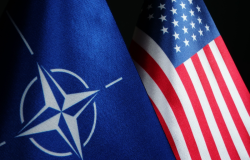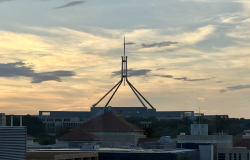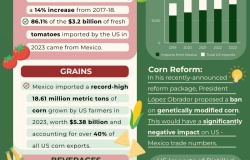Canada and the Arctic: The Issue of Northern Sovereignty
Panelists reviewed the potential implications of Canada's recent efforts to reassert its sovereignty over the country's northern territory on Canada-U.S. relations. They also assessed the potential security threats and economic opportunities that accompany the possibility of an ice-free Arctic.
Overview
Global warming has helped create the conditions necessary for a "perfect storm" when it comes to Canada-U.S. Arctic relations, argued Rob Huebert of the University of Calgary's Centre for Military and Strategic Studies, at a conference hosted by the Canada Institute on December 11, 2007. Huebert was joined by the academic director of the Liu Institute for Global Issues, Michael Byers, for a panel discussion on the potential implications of Canada's recent efforts to reassert its sovereignty over the country's northern territory on Canada-U.S. relations. The program also provided an opportunity to assess the potential security threats and economic opportunities that accompany the possibility of an ice-free Arctic.
The State of the Arctic
Byers began his presentation by describing his participation on a voyage in October 2006 through Bellot Strait, a narrow Arctic channel separating the most northerly point of the North American mainland from Somerset Island in Canada's far north. Traveling with top Canadian and U.S. Arctic scientists, Byers said that the voyage marked the first time in history a vessel had been able to cross the typically frozen strait in the month of October. He noted that the scientists and members of the Canadian Coast Guard on board were "collectively terrified" that the strait was entirely ice-free during the voyage. For Byers, the experience illustrated the alarming rate of melting Arctic sea ice currently taking place. In fact, noted Byers, between September 2006 and September 2007, an estimated 1.2 million square kilometers of Arctic sea ice melted—a figure which represents a surface area far greater than the state of California. If this trend continues, the Arctic could have seasonal ice-free periods within the next 10 to 15 years.
The looming possibility of an ice-free Arctic presents a series of challenges to Arctic nations vying for control over potentially lucrative shipping routes and undersea natural resources. The issue of navigational rights through the Northwest Passage remains one unresolved Arctic issue that has periodically caused friction between Canada and the United States. Byers explained that while the United States and other maritime nations claim the Northwest Passage is an international strait that can be crossed freely by all vessels, Canada contends that it has sole jurisdiction over the waterway and therefore has the right to deny access to foreign flag vessels.
Historically, said Byers, Canada and the United States have simply "agreed to disagree" over Northwest Passage navigational rights, noting that the strait's thick ice has rendered passage impossible to everything other than icebreakers and submarines. Yet, with Arctic sea ice melting rapidly, the Northwest Passage has suddenly emerged as a potentially invaluable shipping route that could escalate tensions between Canada, the United States, and other nations that recognize the strait as international waters, unless the dispute is resolved.
Making Canada's Case to Control the Northwest Passage
According to Byers, to win its sovereignty claim, the Canadian government must convince the United States that the Northwest Passage would be more secure if it recognized Canada's jurisdiction over the Arctic strait. As the passage becomes ice-free, explained Byers, Canada's northern sea routes will become increasingly vulnerable to drug trafficking, as well as ships carrying illegal immigrants, terrorists, or weapons of mass destruction. If Canada's sovereignty over the Northwest Passage were recognized internationally, the Canadian government would have the ability to carry out maritime interdictions that would not be possible if the strait were considered international waters. Thus, argued Byers, the probability of Canada winning its sovereignty claim hinges in part on the Canadian government's ability to convince the United States that it is in its own national security interest to allow Canada to control the Northwest Passage.
Nevertheless, in order to make this argument convincingly, maintained Huebert, Canada must take measures to ensure it has the surveillance and patrol capabilities necessary to secure the Arctic waterways. Several incidents, noted Byers and Huebert, have demonstrated Canada's current inability to conduct adequate surveillance of its northern territory. One such incident involved a small vessel carrying five Norwegian passengers who attempted to transit the Northwest Passage illegally. Not only were Canadian authorities slow to detect the vessel once it entered the strait, they also waited until the Norwegian passengers landed on Canadian soil before apprehending them to avoid the potential legal implications of conducting a maritime interdiction on the Northwest Passage. The situation turned particularly alarming when Canadian authorities revealed that two of the detained passengers were members of the Norwegian Hells Angels motorcycle gang.
Both Huebert and Byers cited the incident as a clear indication of the potential for the Northwest Passage to be used to traffic illegal goods, as well as need for the Canadian government to improve its surveillance capabilities of the Arctic, and develop more clearly defined procedures for carrying out maritime interdictions in Arctic waterways.
Aside from the security dimension, Byers and Huebert outlined several other issues that have surfaced as a result of the rapidly melting Arctic ice. Byers noted that Canada's Inuit population—who live, travel, and hunt on Arctic ice—are at risk of losing their traditional way of life as a result of global warming and increased development and economic activity in Canada's North. He also suggested that economic development and climate change pose huge threats to the "extraordinarily fragile" Arctic marine ecosystem. Byers cautioned that the Northwest Passage could become a viable route to transport oil and gas, which vastly increases the risk of a major oil spill in Canada's Arctic region. Such an occurrence, argued Byers, would be "catastrophic" not only for the Arctic ecosystem, but also for Canada's Inuit population.
Despite the environmental risks, economic development in the Arctic is expected to move forward. Huebert noted that several major oil companies believe that the Arctic may hold up to 25 percent of the world's undiscovered oil and gas reserves. Attempts to gain control over these resources, maintained Huebert, could lead to international disputes over unresolved land claims between Arctic nations in the near future. He warned that Canada and the United States could face a major conflict over control of part of the Beaufort Sea—an area believed to be rich in undiscovered oil and gas reserves—that could be more contentious than the ongoing bilateral dispute over the Northwest Passage. Both countries are currently preparing their case to settle a maritime boundary dispute that would decide which country controls offshore oil rights in the Beaufort Sea. In order for the United States to win its claim, the U.S. government must first follow Canada's lead and ratify the United Nations Convention on the Law of the Sea. Failure to ratify the treaty would prevent the United States from asserting its rights over offshore areas. Regardless of whether or not the United States decides to ratify the treaty, Huebert maintained that Canada and the United States will most likely face tense bilateral negotiations over control of the mineral-rich portion of the Beaufort Sea in the near future: "We will see this issue escalate."
Moving Forward
"When it comes to Canada and the United States, each and every [Arctic] issue can be resolved," maintained Huebert. In the case of the Beaufort Sea dispute, Huebert pointed out that Canada and the United States could develop a "joint management scheme" over resources in the region that would allow both countries to prosper. Huebert noted that while resolving current international Arctic disputes will require a great amount of political will to successfully achieve, reaching major agreements is not out of the realm of possibility. In 1988, one such agreement was nearly struck that would have resolved many Arctic sovereignty issues between Canada and the United States and set international standards for Arctic shipping and construction. Although opposition from the U.S. State Department ultimately led to the agreement's demise, the fact that it was nearly negotiated successfully by both Canada and the United States offers hope that future bilateral or multilateral agreements can be reached. Huebert cautioned, however, that efforts to resolve Arctic disputes must begin now in order to avoid major international confrontations over Arctic land and resources: "The stakes are becoming very high and the longer the issues are allowed to fester the more difficult they will be to solve."
Drafted by Ken Crist, Program Associate
David Biette, Director, Canada Institute
202-691-4270
Panelists:
Rob Huebert, Associate Director, Centre for Military and Strategic Studies, University of Calgary
Michael Byers, Academic Director, Liu Institute for Global Issues, University of British Columbia
Hosted By

Polar Institute
Since its inception in 2017, the Polar Institute has become a premier forum for discussion and policy analysis of Arctic and Antarctic issues, and is known in Washington, DC and elsewhere as the Arctic Public Square. The Institute holistically studies the central policy issues facing these regions—with an emphasis on Arctic governance, climate change, economic development, scientific research, security, and Indigenous communities—and communicates trusted analysis to policymakers and other stakeholders. Read more

Canada Institute
The mission of the Wilson Center's Canada Institute is to raise the level of knowledge of Canada in the United States, particularly within the Washington, DC policy community. Research projects, initiatives, podcasts, and publications cover contemporary Canada, US-Canadian relations, North American political economy, and Canada's global role as it intersects with US national interests. Read more
Thank you for your interest in this event. Please send any feedback or questions to our Events staff.










